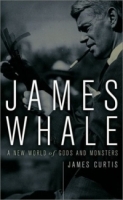| James Whale: A New World of Gods and Monsters артикул 467c. |
 |
Amazon comYou may not recognize James Whale, but you surely recognize his most prominent contribution to American popular culture: Frankenstein's monster, as portrayed by Boris Karloff Whale, a British expatriate who made his way to Hollywood just as films were making the transition to the talkies, directed both the original Frankenstein (1931) одчмз and its sequel, The Bride of Frankenstein (1936), for Universal Pictures Afraid of being pigeonholed as a horror director (he also made The Invisible Man and The Old Dark House), he eventually insisted on more mainstream projects, including the musical Show Boat and The Road Back, a sequel to All Quiet on the Western Front that flopped at the box office Today, The Bride of Frankenstein is considered to be his best film, a work that combines moments of genuine suspense with a thoroughly macabre sense of humor In 1982, film historian James Curtis wrote his first biography of Whale James Whale: A New World of Gods and Monsters is not a revision of that book, however, but a substantial reworking involving much in the way of new research Whale's life story is emblematic of an entire generation of European émigrés who made critical artistic contributions to American film only to find themselves in ultimate obscurity Although recent fictional and truthful accounts of Whale's life have emphasized his homosexuality--even the jacket cover of this book cites it as the reason for Hollywood's eventual rejection of Whale--Curtis himself tells a more nuanced tale Certainly, Whale made no attempts to hide his preference for men; at the same time, he made his sexual orientation neither a prominent feature of his personal life nor his movies While it's possible that he was fired from Columbia Pictures in 1941 because of homophobia on the part of studio owner Harry Cohn, it should also be noted that it didn't take much to get on the bad side of Harry Cohn and that, perhaps more to the point, Whale hadn't had a significant commercial hit in five years Curtis's biography is filled with fascinating anecdotes from David Lewis, Whale's longtime companion, and several of the actors who worked with Whale, including Peter Cushing and Gloria (Titanic) Stuart It also has a rich appreciation of the artistic qualities of Whale's work It is, in short, the sort of critical biography that any film director would hope to have --Ron HoganBook DescriptionJames Whale directed some of the most stylish movies of the 1930s, but he was most successful in a genre he virtually invented Most famously in Frankenstein, but also in The Invisible Man and The Bride of Frankenstein, Whale created a new type of horror film -sophisticated, tragic, and morbidly humorous Whale made grim war dramas, light comedy, adventure, mystery, and even a movie version of the musical Show Boat However, his career faltered and, being openly gay, he found work increasingly hard to get He quit his film work just ten years after the triumph of Frankenstein, and died as a result of suicide James Curtis has written the definitive life of James Whale, taking him from poverty in rural England to the squalor of a German prison camp, to the excitement of London's West End, and ultimately to Hollywood, where he profoundly influenced several generations of filmmakers James Curtis is also the author of W C Fields (2003) and Between Flops: A Biography of Preston Sturges (1982). Настоящее2003 г 455 стр ISBN 0816643865. |